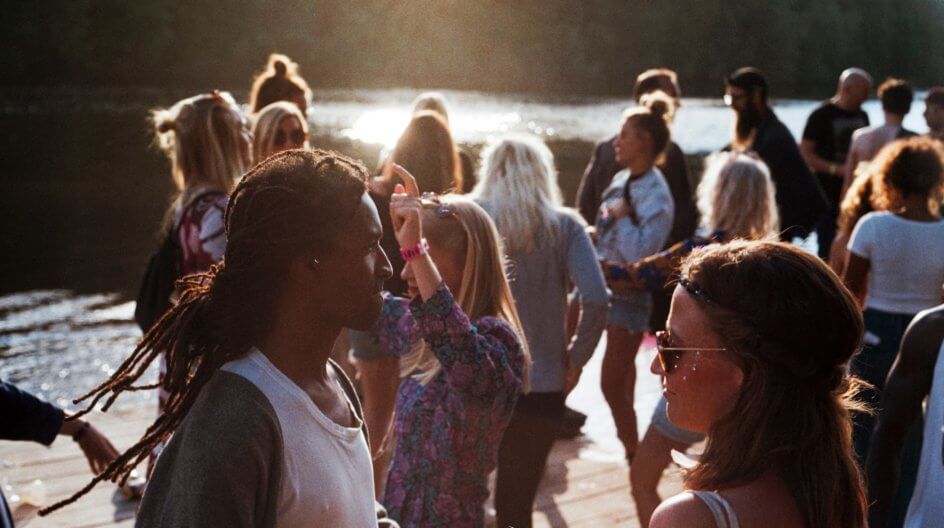Ever been at a party and spent your time staring at your phone, because talking to the person next to you seemed scary?
Ever been standing behind a cute stranger at a check out lane, and you were way too terrified to open your mouth and say something?
If the idea of talking to strangers scares you, and you wouldn’t even know what to say even if you did open your mouth, you’re not alone.
I’ll tackle the second problem – what to say – in a bit. First, let’s talk about why it’s so scary to talk to strangers, to begin with.
Why it’s scary to talk to a stranger
To make sense of that fear, we need to look at your evolutionary history. So please grab your loincloth and your DIY club, and take a seat in The Art of Charm Timemachine™:
Until about 10,000 years ago, your ancestors lived in hunter-gatherer societies. You know, where men were pretending to hunt for bears while the women collected all the food by looking for berries and nuts. Those groups were, compared to your Facebook friends circle, insanely small. 150 people at the most, and that’s only if it was a massive tribe.
Your ancestors spent their entire life in that group. They knew everything about each other – their favorite color, how many bears they pretended to have killed, and whether they liked their squirrel rare, medium or cooked.
To them, the saying “A stranger is a friend you haven’t met yet” wouldn’t make any sense.
In an environment where resources were scarce, seeing an unfamiliar face meant you had to form a defensive circle around your favorite banana tree because someone’s coming to take it.
Was that the case with every stranger the group encountered? I guess not. It was probably alright to walk up to the odd stranger, compliment their tiger tooth necklace and then get shitfaced on some rotten fruit together. It just wasn’t a good survival strategy.
Those that made talking to strangers a habit sooner or later ended up with a spear-shaped hole in their body. And that’s really counterproductive when you’re planning to have offspring one day, to pass on your “I like talking to strangers!” genes.
Evolution favored those who threw stones first and asked questions later.
And it worked well for 200,000 years.
In today’s world, things have changed a lot. Our ancestors knew 150 people at most, and we can meet that many in a single day. Or in half an hour if you’re on Tinder and you have a really fast thumb.
Due to the way our society has changed, most – if not all – of the people we come across during a normal day are strangers or acquaintances. And yet, our brain is still running an operating system that’s been developed 200,000 years ago. It’s casting a suspicious eye on everyone and our internal firewall flags them as “Unknown person. Might try to poke me with a spear.”
And that, my time-traveling friend, is the reason that we can live in a large city and still feel lonely.
And it’s only getting worse.
The spread of loneliness in a crowded world
In a study titled “Social Isolation in America: Changes in Core Discussion Networks over Two Decades”, Miller McPherson and his team found that between 1985 and 2004, the number of people saying that there’s no one in their lives with whom they can discuss important matters nearly tripled. When they asked how many close friends people had, the most common answer in 1985 was three. In 2004, it was zero. And it probably hasn’t gotten better since then.
This has profound effects on our happiness, and also on our mental and physical health.
Loneliness has devastating effects on our wellbeing
We, humans, have a deeply rooted need to belong, and our physical, as well as mental well-being, take a massive hit if this need is not met.
That’s what Roy Baumeister and Mark Leary conclude in their 1995 paper, “The need to belong: Desire for interpersonal attachments as a fundamental human motivation.”
Plenty of other studies found that loneliness is one of the big contributors to premature death, just like smoking, obesity, and alcoholism is.
Why are quality connections so beneficial to our health?
Many of the reasons are tied to stress reduction: When you have people that you can rely on, you don’t have to worry so much:
- When you are sick, you know there’s someone who’ll make you some hot soup when you ask nicely.
- When you’re going through a breakup, you know your friends are there to help you eat that bucket of ice cream while you binge-watch Stranger Things.
- When you just got laid off, you know that there are people who will help you with your job search or let you sleep on their couch, even if you snore.
Of course, you could argue that in this day and age, we have health care, an unemployment system, and when things get tough, hospitals or the police. It’s one of those things that make more sense when you look at it from an evolutionary perspective. Our brain is still running that old operating system:
- We were dependent on our tribe for safety and protection
- Our ancestors knew they could yell for support when they get attacked by a predatory sloth
- They could scrounge a squirrel or two from their friends when they were hungry
- And they didn’t have to worry about dying the moment they bruised an ankle
Another reason is that when we are connected to a group, we feel responsible for the people in it. That gives us that sense of purpose we talked about in this podcast episode.
It also means that we take better care of ourselves because we want to be there for them for a long time, and we want to be our fittest.
It’s ironic, really. For most of our evolutionary history, we were conditioned to be afraid of strangers. Then we built a society where we’re basically only surrounded by strangers. And then we go on the Internet to read lengthy blog posts on what to do about it.
Now that I’ve covered how we got into this entire mess, let’s talk about how to get out of it.
How to create a sense of belonging, even when you’re around strangers
Let’s start with some good news: You can feel like you belong, even if you don’t (yet) have a social circle to call your own. You can literally create that feeling when you get your cup of coffee in the morning.
That’s what Gillian Sandstrom and Elizabeth Dunn found in their study titled “Is Efficiency Overrated? Minimal Social Interactions Lead to Belonging and Positive Affect.”
The researchers split the participants into two groups. One group was asked to order a coffee as they usually would. The other group was asked to go in and have a brief, friendly chat with the barista as if he or she were an acquaintance. The second group left Starbucks feeling a lot better than their quiet counterparts.
It was the first study to show that it’s possible to improve our happiness and belonging by turning simple, everyday encounters into social interactions.
Similar studies have been done on commuter trains or waiting rooms – with the same effect.
People in all three studies felt much better afterward.
This is called Fleeting Intimacy or Street Intimacy. It doesn’t take much to create a sense of connection and belonging.
Even these small interactions, like chatting with the barista at the cafe or with the person in front of you at the checkout lane – something that sociologists call “Minimal Social Interactions” can fulfill this basic human need for sociability and connection.
Why it’s easier to talk to strangers
And not only that. In many ways, it’s actually easier to talk with someone we don’t know, than with someone close that we’ve known all our lives. And that’s even more true for introverts.
Here are a few reasons why it is easier:
- We are a lot clearer in our communication when we talk with someone we don’t know. We know that the other person has no clue about our backstory, our particular character traits, or what we really think about our in-laws. And so we automatically explain everything.
With friends and family, we often assume that they get what we’re thinking. And then we’re annoyed when we get the complete Game of Thrones DVD collection for our birthday – didn’t we clearly roll our eyes during the final season?! - We really have nothing to lose when we’re starting a conversation with a stranger. No one’s going to hit you over the head with a spear. The worst that can happen is that they’re not interested.
- People we don’t know can be much more likely to open up than even people in our social circle.
That’s something I’ll cover in more detail when we get to the actual techniques later on.
Why introverts have an easier time talking to strangers
Let’s look at a few factors that actually make it easier for introverts who usually struggle in social situations:
- You’re not looking at a lengthy conversation that’s going to drain your batteries all the way to zero.
- If deep and meaningful conversations are what challenges you, then you’re in no way required to go there. It’s perfectly alright to have a friendly chat about the nice weather or why you like tomatoes.
- You can end the conversation at any point without being rude. That’s very rare in most interactions. Try that on a date, your boss or with a romantic partner and you’ll suffer the consequences!
- There are absolutely no expectations on either side and so you can’t fail to begin with.
6 Tips for talking with anyone
Here are six tips when you’re talking with a stranger:
- Gaze briefly at the other person and see if it’s reciprocated. If that’s the case, answer with a smile.
But please be aware that there’s a difference between a gaze and a stare. A stare will more likely create a fight reaction, as Phoebe Ellsworth and her team showed in their study “The Stare as a Stimulus to Flight in Human Subjects: A Series of Field Experiments.” in the Journal of Personality and Social Psychology.
If a person doesn’t gaze back at you, then trying harder is not going to help. - Saying “Hello”, “How are you” or similar phrases.
This is called Phatic Communication – it’s almost without factual information or literal meaning, but it has tremendous social value. It says: “I see you and I want to be friendly because you’re a person too”
If you’ve ever worked in the service industry, you know how likely it is that you’re mistaken for a walking, talking piece of furniture that knows how to hand over the food.
The value of these phrases lies in acknowledging the other person – so make sure you’re also making eye contact while you say it. - Making a casual comment about a shared space or experience, like commenting on something you can both see.
This is called Triangulation. It’s powerful because it starts the conversation with a very low commitment for both sides. You’re not talking about the other person or even yourself, but about a third element – maybe it’s the bus that’s late or the pink poodle that just did a somersault.
And if that starts off a nice conversation, feel free to ditch that third element and talk about the other person and/or yourself! - A compliment also often works in starting a conversation – provided it’s given genuinely and in a respectful manner.
You can follow it up with a question if you like (“Where did your poodle learn to do somersaults like that?”), but you don’t have to. - Asking for something – like directions – doesn’t tend to work very well.
You’re making a request. And while the other party is expected to answer, that’s also where the conversation will end. In the eyes of the other person, it’s now complete. Making a request is not social interaction, it’s a transaction. - A stranger is much more likely to share something personal if you share something personal first. Much more likely even than your personal connections.
“Disclosure begets Disclosure”, writes Sidney Jourard in his book “Self-Disclosure: an Experimental Analysis for the Transparent Self”
In short, it’s actually easier to be vulnerable around strangers, and they’ll reciprocate much more likely. That’s because it’s an interaction between two people who will most likely never see each other again.
Here’s where it gets really interesting and counterintuitive: this doesn’t work with sharing just facts – the reciprocity quickly goes out of the window. Why? Probably because facts are inherently less interesting than learning something personal about the other person.
After happiness, health, and a sense of belonging, here’s yet another reason why you should talk with anyone:
Talking to Strangers might solve all your problems (ok, some of them)
In his seminal work “The Strength of Weak Ties”, Mark Granovetter describes “Weak Ties” as people in our network who are mere acquaintances. They’re at the fringe of our social network and we spend very little – if any – time with them.
Now it might be easy to dismiss the importance that such a person can have on your life. After all, what’s Jeff, your friendly barista, going to do for you that your friends won’t? What support can George, the guy you chatted with at last year’s Comic-Con, provide, given that he’s living on a different continent?
What Granovetter showed, and what made his work so famous, was the finding that the very power of those weak ties lies in the fact that they’re not close to us.
Think about it. While your close ties are probably eager and willing to help you, in many cases their closeness to you is going to be a hindrance.
Your friends:
- know the same people you do
- hang out at the same events you do
- read the same news and classifieds you do
Tell your best friend that you’ve started your business as a web designer, and he might reply: “Dude, I know. You’ve talked of nothing else for a month now!”
But say that same thing to Jeff, your friendly barista, and you might end up with a new client or some referrals.
And the same is true for a lot of things that require new connections:
- Looking for a job or gigs
- Finding the best secret sushi place in the city
- Finding a date who has a pink poodle that can do somersaults
Stranger, if you read this all the way to the end then I hope this was helpful to you!
And if you want to learn how to have engaging conversations, build deeper connections professionally, socially, and romantically… in short, take your social skills to the next level of awesome, then check out Captivate and Connect Workshop.



